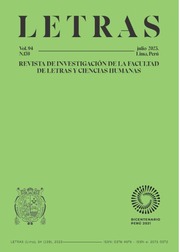Between memory and history, testimony: a tracing that becomes a map. Rereading of the Genre from the Deleuzoguattarian Theoretical Proposal
Abstract
The article examines, centrally, the possibilities of the testimonial account, memory and experience for history and historiographical studies. Faced with this general objective, the work assumes a theoretical-critical-philosophical perspective that seeks to contrast and delve into those most relevant proposals, ideas or conceptualizations that have guided the path of the aforementioned debates to, finally, propose a rereading of the testimony and the historical account (as a trace that becomes a map) based on the deleuzoguattariantheoretical proposals that appeared in A Thousand Plateaus. Capitalism and Schizophrenia. The five sub-themes that make up the study are the following: “The belief in historical representation”; “Poetic configuration of the real past”; “Memory as the matrix of history”; “The privilege of memory against the pact of truth” and “The testimony, like the historical discourse itself: a tracing that becomes a map”. During the last section or subtopicof the article, and based on what was discussed previously, two novel hypotheses are suggested and developed that could constitute the starting point for new conceptual proposals around the testimonial genre, specifically, and regarding the forms of writing of history, its procedures and ways of understanding. These hypotheses are part of the research results of this work.Downloads
Métricas alternativas
References
Caruth, C. (1995). Introduction (I y II). En Trauma: Explorations in Memory. The Johns Hopkins University Press.Chartier, R. (1992). El mundo como representación. Estudios sobre historia cultural. Edi-torial Gedisa.
Deleuze, G. & Guattari, F. (2004). Mil mesetas. Capitalismo y esquizofrenia. Valencia: Pre-Textos.
Hume, D. (2001). Tratado de la naturaleza humana. Diputación de Albacete, Libros en la Red.
Jelin, E. (2002). Los trabajos de la memoria. Memorias de la represión. Siglo XXI.
Kaufman, S. (1998). Sobre violencia social, trauma y memoria. Seminario Memoria Colectiva y Represión auspiciado por el SSRC. Montevideo.
LaCapra, D. (2005). Escribir la historia, escribir el trauma. Ediciones Nueva Visión.
Mudrovcic, M. I. (2005). Historia, narración y memoria. Los debates actuales en filosofía de la historia. Ediciones Akal, S. A.
Ricoeur, P. (2000). Historia y memoria. La escritura de la historia y la representación del pasado. Annales, Histoire, Sciences Sociales, 55, 731-747.
Ricoeur, P. (2003). La memoria, la historia, el olvido. Editorial Trotta.
Todorov, T. (2000). Los abusos de la memoria. Ediciones Paidós.
White, H. (1992a). El contenido de la forma. Narrativa, discurso y representación histórica. Ediciones Paidós Ibérica.
White, H. (1992b [1973]). Metahistoria. La imaginación histórica en la Europa del siglo XIX. Fondo de Cultura Económica. White, H. (2003). El texto histórico como artefacto literario. Ediciones Paidós Ibérica.
Zamora, J. A. (2011). Memoria e historia después de Auschwitz. Isegoría: Revista de Filosofía Moral y Política, 45, 501-523. https://doi.org/10.3989/isegoria.2011.i45.740
Copyright (c) 2023 Letras (Lima)

This work is licensed under a Creative Commons Attribution 4.0 International License.
Este obra está bajo una licencia de Creative Commons Reconocimiento 4.0 Internacional



















